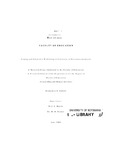Coping and subjective well-being in University of Botswana employees

View/
Date
2015-06-19Author
Odirile, Bonkamile E.
Rights holder
University of BotswanaType
Masters Thesis/DissertationMetadata
Show full item recordAbstract
The study examined how age, experience, qualification, type of job and the section of employment influenced the use of coping strategies by University of Botswana (UB) employees. It further examined the coping strategies used by UB employees and how the strategies affected their well-being at the workplace. Sixty three participants from the two campuses in Gaborone were studied (N= 63; mean age 41.3). The participants completed the Coping Orientation to the Problems Experienced (COPE -
English version) which measures different behaviors and cognitive activities one might engage in to cope with stress, and the Satisfaction With Life Scale (SWLS) which comprised questions that measured cognitive judgement of Subjective Well-being (SWB). Senior staff status correlated with satisfaction of life, r = -.25: p<0.01. Lower qualification correlated negatively with avoidant strategy, r = -.25: p < 0.01 and positively with satisfaction of life, r = .34: p <0.01. Coping strategies are usually similar
for people in the same qualification or employment status.
